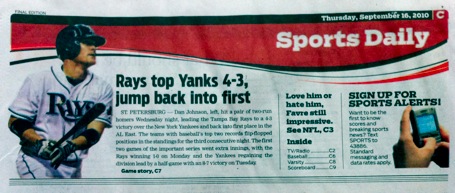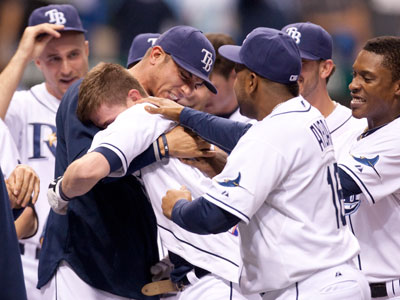My son put this together in a burst of inspiration this morning. I present it here unedited and without comment. Enjoy. I think.
The Christmas Story
For Baseball Addicts
Here is a Halladay story for you. Some shepherds were sitting on the field one night. They were there to protect the sheep from Cubs, Diamondbacks, and wild Tigers. Stuff like that. You probably didn’t know this, but the shepherds were actually Twins. They were sitting there, minding their own business. One was leaning against some Rockies while the other tugged on his White Sox.
All of a sudden there was an Angel standing in front of them, with Rays shining all over the place. The shepherds were terrified. The Angel spoke. “Don’t be afraid, be Braves! I have great news. This isn’t just of Nationals importance, but it is for the World! I want you to o-Pena ears and Lee-sin well. Howard you like to know that you are no Longoria waiting for a savior, but he is here? He has come to pay the Price for the world’s sin and will be a Shields for you from the wrath of God. So stop laying around! God’s Victorino is sure! Get Upton go into town. You will find a baby in a dugout stable. That’s him!” Then an entire team of Angels were there, singing an anthem and re-Joyce-ing.
When they had gone the shepherds jumped up and said “F-Orioles?? Awesome!!” and ran off, feeling as big as Giants. They broke the Cardinal rule of shepherding, leaving their sheep to their own defense. The shepherds were a couple of Athletics, because they ran all the way to the stable without stopping, and there they found the baby, with his mother and his Padre, just as the Angel and told them they would.
Meanwhile, a long way to the East, a group of Royals were meeting. “I was sure I knew All Stars, but there is a new one! Let there be no more divisions between us, and let’s go see what’s happening. What are those Brewers up to?” So, like a group of Rangers, they packed their camels and headed out. They were really committed, because it was a two year contract that they signed up for! When they finally found him, they said it was well worth it, and he was the best person they had ever Mets.
This little baby grew up to be a man who changed the world. He gathered to him a group of Dodgers, Pirates, and Mariners, and taught them the truth. Eventually he made a surprise sacrifice play, and by it won the game.
Merry Christmas, everyone, and Phillies Navidad!



